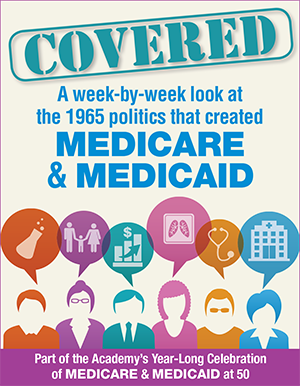Bob Rosenblatt, Special Correspondent
Welcome to Covered: A Week-by-Week Look at the 1965 Politics that Created Medicare and Medicaid. Bob Rosenblatt, a Senior Fellow at the National Academy of Social Insurance, former Los Angeles Times Washington correspondent, and editor of the website HelpWithAging will blog on the maneuvers that led to the enactment of Medicare and Medicaid on July 30th, 1965 the first major expansion of U.S. social insurance to health care.
House Panel Aims to Help Elderly in Poor Health Leave Mental Hospitals for Nursing Homes
March 20, 1965
By Bob Rosenblatt, Special Correspondent
Washington, DC – More freedoms and better medical treatment may be coming for legions of older people needlessly locked up in mental hospitals throughout the country.
Relief is in the form of health care legislation currently working its way through the House of Representatives. An ambitious program of government-financed health care now under consideration in the Ways and Means Committee will give people over the age of 65 improved access to extensive treatments in a hospital or nursing home setting.
Many older people with serious health problems are now confined to state mental hospitals because they cannot afford paid care, and have no family members or friends who will provide a home for them.
Covering nursing home care would increase federal spending, but it is necessary to free older people from mental hospitals, Rep. Thomas B. Curtis (R-MO) said at a Ways and Means Committee session. “If we get to work on getting these older people out of mental institutions, [the budget] will probably be a bigger figure, because we have a lot of people who ought to really be in nursing homes,” Curtis said. Many more nursing homes would be built in response to the proposed legislation, which would offer health care coverage for the 20 million Americans over the age of 65.
Wilbur Cohen, the Johnson Administration’s point man on the proposed Medicare legislation, agreed with Rep. Curtis’ call to get older people out of mental hospitals, telling the committee, “it would be better for them, and I think the psychiatrists would agree. They would be able to be near their relatives and friends in the communities. There would be people coming to see them and they would be happier.”
For all patients, whether with mental or physical ailments, nursing homes would be part of what Cohen called “progressive patient care,” with patients moving between hospitals and nursing homes and home care, depending on their conditions and doctors’ orders. “We ought to develop, and this is permitted under the bill, more long-term care facilities connected with hospitals, so that when [a] person is in the hospital he can be shifted from a $40 bed to a $10 bed,” Cohen said.
The proposal by Ways and Means Chairman Wilbur Mills (D-AR), now moving through the committee, calls for 60 days of coverage in the hospital, 120 days in a nursing home, and 240 days of home care.
Committee members and expert witnesses are struggling with the complexities of defining and paying for medical care as people will be moving among places to receive care. Walter McNerney, president of the Blue Cross Association, which provides private insurance for millions of people, questioned members of the committee on the definition of a home care visit. “Is it a half-hour visit by a doctor? A two-hour visit by a nurse? Is it a physical therapist going by for 15-minutes with a machine or massage? What is it?” he asked.
Lawmakers also struggled with the design of coverage in facilities that may serve a range of residents. For example, committee members wondered if nursing home residents who don’t have an acute medical condition and who are not being treated by a physician should be covered by Medicare. “What if a person is not under the care of a physician, but the facility meets all the other requirements of a proper nursing home?” Rep. John C. Watts (D-KY) asked.
Social Security Commissioner Robert Ball suggested a possible compromise: some people would be eligible for the federal programs while others would be able to live near-by, in separate buildings and paying privately for their care. There patients could live in “an extended care facility, a wing or separately organized part of an old age home…that would be largely custodial, but also has attached to it an extended care [nursing] facility,” according to Ball.
These are the kinds of intricate, detailed discussions the committee is having as it begins to design a blueprint for a transformed health care system for people 65 and over.
► See the next post in the COVERED series, “Medicare Program Clears Major Hurdle with Approval by House Committee,” March 27, 1965
► Learn more about the Academy’s celebration of 50th anniversary of the enactment of Medicare and Medicaid


Thanks a lot for your nice
Thanks a lot for your nice post. Already I have studied your post that is really good.
I have known a lot of information about fitness tracker accuracy that inform me how I keep my fitness long time and which product is best.
It is good feeling to me that another website about fitness tracker accuracy I have known which some important information are
described easily. It has authorization and registration with business law. All information and description are 100% accurate. You can
study this fitness tracker accuracy.